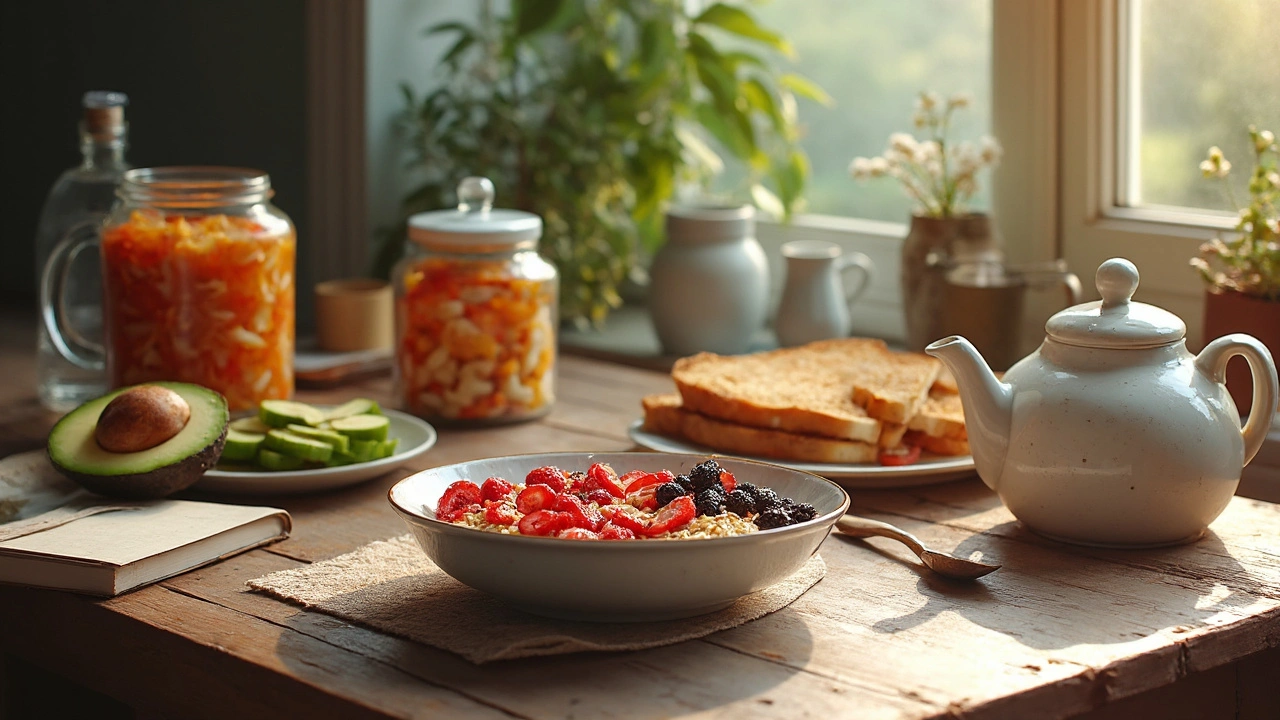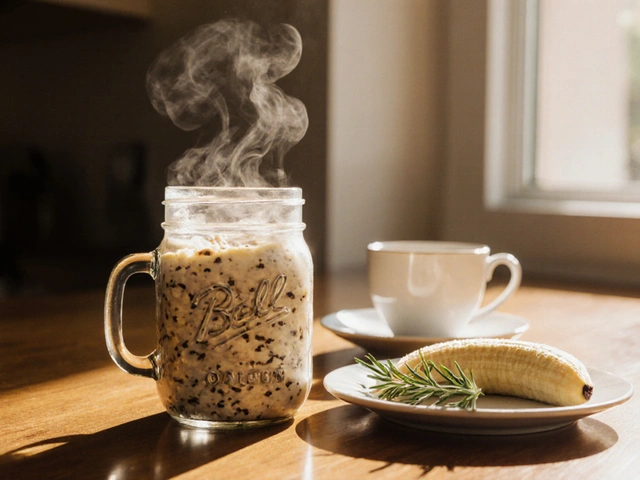Did you know your gut does more than just process food? It impacts your mood, energy levels, and even your immune system. If you’ve ever dealt with bloating after a big meal or felt foggy on a random afternoon, your gut might be trying to tell you something.
Good news: you don’t need to overhaul your whole life—or eat stuff you don’t like—to feel better. Even swapping out your morning bagel for oatmeal can boost gut-friendly fiber. Aiming for more color on your plate means more plant-based variety, which keeps gut bacteria happy. Kids like mine (Marjorie, you know how picky she is) sometimes turn up their nose at veggies, but even sneaking in some berries at breakfast or carrots with hummus after school makes a difference.
- Why Your Gut Matters
- Daily Foods That Improve Digestion
- Habits That Hurt (And Help)
- Myth Busting: Probiotics and Prebiotics
- Simple Changes, Big Results
Why Your Gut Matters
Your gut isn’t just a long tube for digesting food. It’s packed with trillions of bacteria—good, bad, and everything in between. This community is called your gut microbiome, and it’s busy breaking down what you eat, making vitamins, and teaching your body how to fight off germs.
Here’s the kicker: about 70% of your immune system lives in your gut. So if your gut is out of balance, you’re more likely to get sick, feel low on energy, or even notice skin problems. Ever hear people talk about a ‘gut feeling’? There’s actually some truth to that—your gut and brain chat nonstop through the gut-brain axis. That’s why gut health can affect your mood and stress levels.
When your gut health tanks, you might deal with things like constipation, food sensitivities, tiredness, or plain old crankiness. It might even mess with your sleep. Studies have even linked poor gut health to conditions like diabetes, autoimmune issues, and allergies. All that from a part of your body you barely think about daily.
So, taking care of your gut isn’t just about dodging stomach aches. It sets the stage for everything else—energy, focus, immune strength, even how you handle stress with the kids or at work. Small moves here matter more than most people realize.
Daily Foods That Improve Digestion
Your gut really likes variety, but some foods pack extra punch when it comes to keeping things moving and your system happy. One of the easiest wins? Fiber. You don’t have to count every gram, just try to get a good mix. Look for oats, beans, lentils, apples, berries, broccoli, and leafy greens. If you usually eat white bread or white rice, swapping to wholegrain versions can make a real difference. My daughter Marjorie swears she doesn't like brown bread, but if I toast it and throw on some peanut butter, she barely notices.
Fermented foods are another go-to. Yogurt with live cultures, kefir, sauerkraut, kimchi, miso, and even a little kombucha can give your gut those helpful bacteria it loves. You don’t need to eat big portions—just a spoonful of kimchi or a small cup of yogurt does the trick. When my stomach feels off, spooning plain yogurt into breakfast makes everything calmer fast.
If dairy isn’t your thing, try plant-based options like coconut yogurt or fermented soy products. Just check for “live cultures” on the label—otherwise, you’re missing out on the gut benefits.
Don’t skip water. Even if you hit your fiber targets, without enough water, things slow way down. Aim to sip all day—fill up a bottle and just keep it near you.
In summary, here’s a gut-friendly shopping list:
- Oats and high-fiber cereals
- Berries, apples, and bananas
- Leafy greens and cruciferous veggies (like broccoli)
- Beans and lentils
- Yogurt with live cultures or kefir
- Kombucha, kimchi, sauerkraut, or miso
- Plenty of water
Making small swaps with these “everyday” foods really can add up. Your gut health starts improving with every bite—not next week, but today.

Habits That Hurt (And Help)
Some things we do every day can mess with our gut health without us even noticing. Skipping meals, eating late at night, or eating super fast? All of those stress out your digestive system. When my daughter Marjorie rushes through dinner to get to her homework, she ends up with stomachaches—no surprise there.
Sneaky habit number one: mindless snacking. Grabbing chips on the run or munching in front of the TV means you’re not paying attention to what or how much you eat. That usually leads to eating more than your gut can handle at once. And speaking of snacks, processed foods loaded with added sugars and fake ingredients feed the “bad” bacteria, tipping the balance the wrong way.
Then there’s the “too much, too fast” problem. Shoveling food in a hurry makes your gut work harder to break things down, causing gas and bloating. People often skip water until they feel parched, but staying hydrated actually helps move food through your system smoothly.
- Eat slowly. Chew your food (really chew—it helps a ton).
- Try to eat meals around the same times each day to keep your gut in sync.
- Instead of processed snacks, stash cut fruit or nuts for easy grab-and-go options.
- Aim to get up and move a bit after eating, even if it’s just a walk around the block.
Another big one: stress. When life gets busy (and when isn’t it?), gut problems can get way worse. Your brain and gut talk all day long, so regular stress management—like deep breaths, stretching, or a five-minute break outside—can keep things calmer inside and out.
Even small tweaks to your daily routine can help your digestive system work better. Just a couple habits can bring you more energy, less discomfort, and even a better mood.
Myth Busting: Probiotics and Prebiotics
It feels like every yogurt ad promises magic from probiotics these days. But here’s what actually matters if you want better gut health: understanding the facts, not the hype.
Let’s clear up the basics first. Probiotics are live bacteria found in certain foods and supplements. Prebiotics are types of fiber that feed your healthy gut bacteria. Both matter, but they aren’t miracle workers on their own.
- Probiotics: You’ll find them in foods like yogurt, kefir, sauerkraut, and kimchi. Not all products have enough live cultures to really impact your gut, though. When you see “live and active cultures” listed, that’s a good sign.
- Prebiotics: These are found in foods like bananas, onions, garlic, asparagus, and whole grains. Your body can’t digest these fibers, but your gut bacteria love them. More prebiotics = a happier, more diverse gut microbiome.
Here’s a table showing real stats on how different foods stack up:
| Food | Probiotics (CFUs per serving, est.) | Prebiotics (grams per serving) |
|---|---|---|
| Yogurt (plain, live culture) | 1–10 billion | 0 |
| Banana (medium) | 0 | ~2.5 |
| Kimchi (1/2 cup) | ~4 million | 0.4 |
| Onion (medium, raw) | 0 | ~1.1 |
Now, not every probiotic supplement works the same way for everyone. Some strains help with diarrhea, others might boost immunity, and some don’t do much at all. If you’re healthy, you probably don’t need to pop probiotic pills every day.
One thing people get wrong: more isn’t always better. Taking mega-doses doesn’t magically fix your gut. Plus, if you only focus on probiotics but skip the fiber (prebiotics), those good bugs won’t thrive.
- Skip the sugar-bomb yogurts—they barely help your gut.
- Eat more plants and fibers to actually feed your gut bacteria.
- Try to get both probiotics and prebiotics from real food before reaching for supplements.
If you’ve just finished antibiotics, adding more fermented foods might help restore balance. But day-to-day, the biggest wins come from a mix of high-fiber foods and a few bites of fermented stuff each week. Simple, real food works better than any quick-fix pill.

Simple Changes, Big Results
You don’t need to go on a gut health crusade to start seeing some big changes. Little habits, done every day, add up way faster than some crash “cleanse.” Most folks notice less bloating and more regular digestion just by tweaking a few daily routines.
Start with your plate. Aiming for 25-30 grams of fiber per day keeps your gut in good shape, but most people barely hit 15 grams. Fiber-rich foods like beans, oatmeal, and raspberries get things moving and feed healthy gut bacteria. Here’s a quick list that covers easy ways to sneak in more fiber during a normal week:
- Swap white bread for 100% whole wheat or rye—every sandwich makes a difference.
- Add a handful of broccoli or carrots to lunch. Don’t overthink it—just toss in what you have.
- Sprinkle ground flaxseed on yogurt, cereal, or even pancakes. My daughter Marjorie actually likes it. Shocker, right?
- Pick fruit as a snack once a day instead of crackers or chips.
Pay attention to what’s in your cup, too. Sugary sodas or energy drinks mess with bacteria balance, while water keeps digestion smooth. The old advice is true: eight cups a day really helps.
Sometimes, folks get obsessed with expensive probiotics. Here’s what Dr. Justin Sonnenburg, co-author of “The Good Gut,” says about that:
“Plant diversity in your diet feeds your microbes better than any pill. Probiotic supplements aren’t a replacement for fruits, vegetables, beans, and whole grains.”
So, don’t blow your budget. Focus on eating real food variety first. Still, probiotic foods do count—think yogurt with live cultures, kefir, kimchi, and sauerkraut.
You might be curious about how these swaps affect your actual gut health. Check out the numbers—here’s what research shows about fiber and gut health:
| Habit | Average Gut Bacteria Improvement | Reduction in GI Symptoms (%) |
|---|---|---|
| Adding 10g fiber/day | 20% increase (diversity) | 30-40% |
| Replacing soda with water | 10% improvement (balance) | 20% |
| Eating probiotic foods 3x/week | 15% boost (beneficial bacteria) | 25% |
Bottom line? Simple changes grow into reliable results, especially when you keep the focus on gut health. Try one or two tips for a week—see how your body responds. No guesswork. No fancy fixes. Just habits that actually stick.






